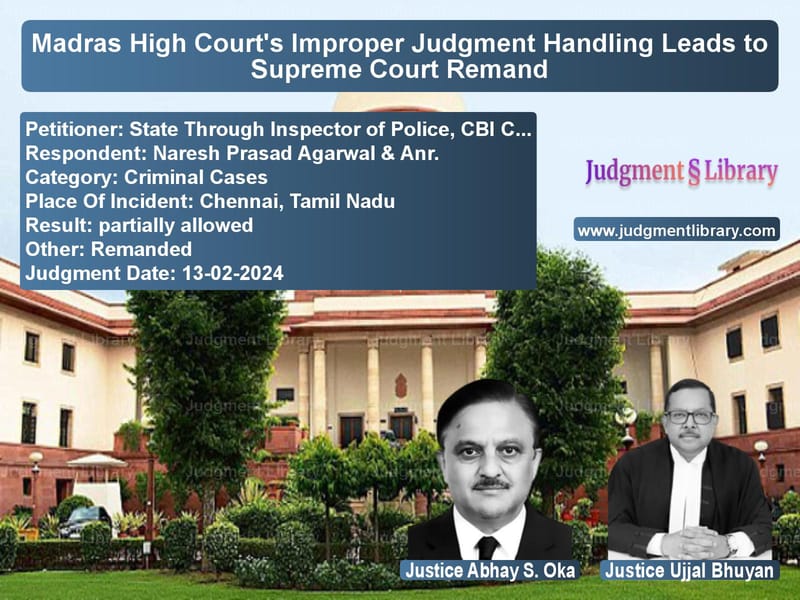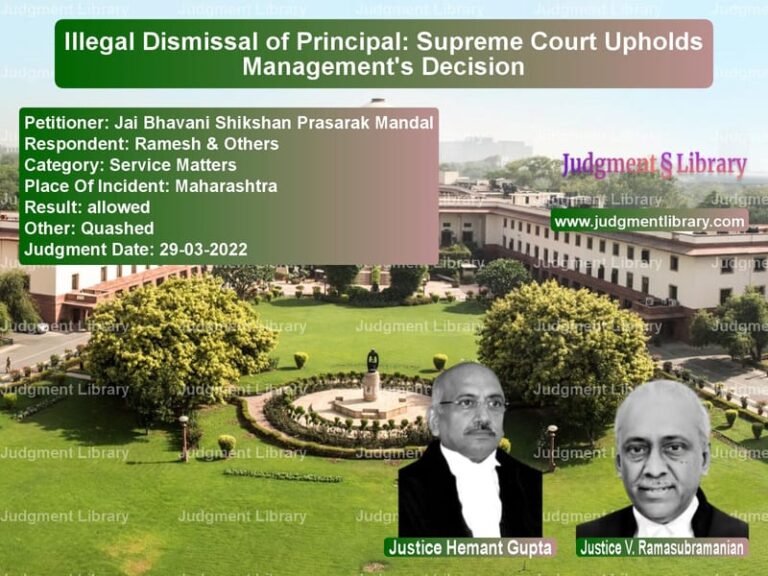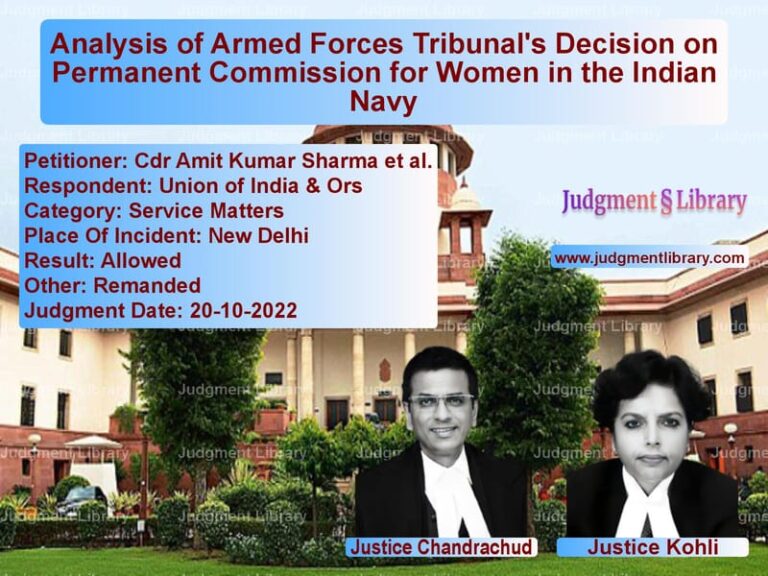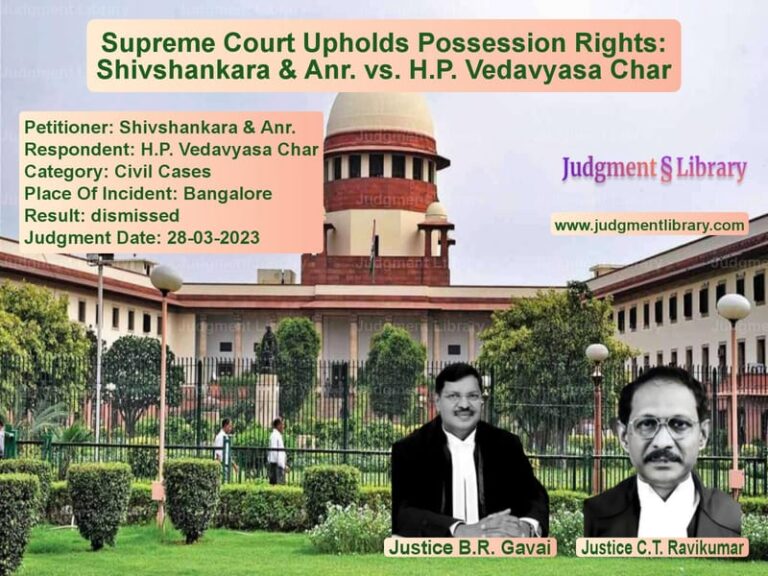Madras High Court’s Improper Judgment Handling Leads to Supreme Court Remand
The case of State Through Inspector of Police, CBI Chennai v. Naresh Prasad Agarwal & Anr. brought forth critical concerns regarding judicial impropriety. The Supreme Court was compelled to set aside the judgment delivered by the Madras High Court due to the delay and irregular handling of its pronouncement. The judgment was remanded back to the High Court for fresh consideration, highlighting the importance of timely judicial reasoning and procedural propriety.
Background of the Case
The case originated from criminal proceedings against Naresh Prasad Agarwal and another accused in CC No.3 of 2014 before the Special Judge, CBI Cases, Chennai. The accused sought relief through:
- A petition under Section 482 of the Code of Criminal Procedure to quash the charge sheet.
- A Criminal Revision Application challenging the rejection of their discharge application on August 4, 2015.
The learned Single Judge of the Madras High Court, through an order dated April 17, 2017, quashed the charge sheet for the first respondent and set aside the rejection of discharge for another accused. However, the detailed judgment supporting this decision was released only on October 23, 2017, nearly five months after the judge had demitted office on May 26, 2017.
Petitioner’s Arguments
The prosecution, represented by the appellant State Through Inspector of Police, CBI Chennai, raised serious concerns about the manner in which the judgment was delivered:
- On April 17, 2017, the High Court judge had pronounced only the operative part of the judgment without any reasoning.
- The judge had five weeks before his retirement on May 26, 2017, to release a reasoned judgment but failed to do so.
- The detailed judgment, spanning over 250 pages, was made available five months after his retirement, suggesting it was prepared post-retirement.
- The act of retaining the case files and drafting a judgment after retirement was labeled as gross impropriety.
Respondents’ Arguments
The respondents, represented by senior counsel, attempted to argue that:
- The Supreme Court should consider the case on merits instead of setting aside the High Court’s judgment on procedural grounds.
- The delay in reasoning should not necessarily affect the validity of the judgment.
Supreme Court’s Observations
The Supreme Court, comprising Justices Abhay S. Oka and Ujjal Bhuyan, strongly condemned the conduct of the retired judge. The Court emphasized:
- “Retaining file of a case for a period of five months after demitting office is an act of gross impropriety on the part of the learned Judge.”
- “Justice must not only be done, but must also be seen to be done.”
- “What has been done in this case is contrary to the principles of justice and fairness.”
The Court expressed concerns that the retired judge assigned reasons and completed the judgment long after he ceased to hold office. This was deemed highly inappropriate and contrary to judicial norms.
Final Verdict
Given the procedural irregularities, the Supreme Court set aside the judgment of the Madras High Court and remanded the matter back for fresh adjudication. The ruling included:
- Criminal O.P. No. 21243/2014 and Criminal Revision Case No. 1191/2015 were restored to the file of the Madras High Court.
- The High Court was directed to hear and decide both cases afresh in accordance with law.
- No ruling was made on the merits of the criminal allegations, leaving all issues open for reconsideration.
- Parties were allowed to present any subsequent developments before the High Court.
Implications of the Judgment
This case sets a crucial precedent on judicial accountability. The Supreme Court’s intervention underscores that:
- Judges must ensure that reasoned judgments are delivered in a timely manner while in office.
- Retaining case files post-retirement to draft judgments is a violation of judicial propriety.
- Justice is not only about the correctness of a verdict but also about the perception of fairness and transparency.
Conclusion
The Supreme Court’s decision in this case highlights the judiciary’s responsibility to maintain credibility and fairness in legal proceedings. By setting aside the improperly handled High Court judgment, the Court reaffirmed the importance of timeliness, propriety, and procedural correctness in judicial functions.
Petitioner Name: State Through Inspector of Police, CBI Chennai.Respondent Name: Naresh Prasad Agarwal & Anr..Judgment By: Justice Abhay S. Oka, Justice Ujjal Bhuyan.Place Of Incident: Chennai, Tamil Nadu.Judgment Date: 13-02-2024.
Don’t miss out on the full details! Download the complete judgment in PDF format below and gain valuable insights instantly!
Download Judgment: state-through-inspec-vs-naresh-prasad-agarwa-supreme-court-of-india-judgment-dated-13-02-2024.pdf
Directly Download Judgment: Directly download this Judgment
See all petitions in Bail and Anticipatory Bail
See all petitions in Judgment by Abhay S. Oka
See all petitions in Judgment by Ujjal Bhuyan
See all petitions in partially allowed
See all petitions in Remanded
See all petitions in supreme court of India judgments February 2024
See all petitions in 2024 judgments
See all posts in Criminal Cases Category
See all allowed petitions in Criminal Cases Category
See all Dismissed petitions in Criminal Cases Category
See all partially allowed petitions in Criminal Cases Category







